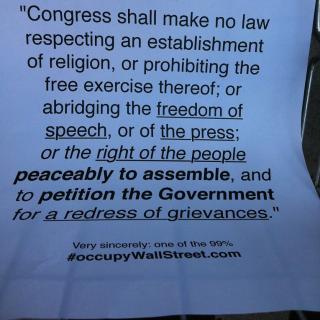“I’m here to stand up for people who don’t make a decent wage,” said Genelle Rhynehardt, who works as a janitor in the Huntington Center in downtown Columbus. “People have to earn more to better their communities and better themselves.”
A member of Service Employees International Union (SEIU) Local 1, Rhynehardt was speaking on November 10 at a #FightFor15 rally on the steps of Columbus City Hall. It was one of 230 solidarity protests held across the U.S. as part of a national day of action. Fast food workers went on strike in 270 cities, demanding a $15 an hour wage and the right to join a union.
The current minimum wage is not a living wage, Rhynehardt said. “For people to try to live on it and live on welfare at the same time is not fair. We want to be able to stand up for ourselves financially, to be able to go to the grocery store and not rely on food stamps.”
Ohio Federation of Teachers president Melissa Cropper described the impact of low wages on children’s education. “I’ve heard from countless parents who want to be involved in their children’s education, but they can’t make it to the parent/teacher conferences or after school events, or help children with their homework, because they’re having to work two or three jobs just to make ends meet,” she said.
“If corporations really want to see education improve, they will pay our parents a decent wage so they have the time and energy to be active in their children’s education,” Cropper said. “This can’t happen when corporations like McDonalds are ripping our parents off every single day. While our parents are providing the services, the corporations are reaping the benefits, and our children are paying the price. This is not right. This is why we need to fight for 15.
“We see change happening across the country in places like Seattle,” Cropper said. “It can happen here, too.”
“Actually, I want $22,” said Gregory Singleton, who works as a security officer at a law firm. “If minimum wage had kept up with the rate of inflation, it would be $21.72 an hour. But $15 is a good start.
“I’ve been working near-minimum wage jobs for decades, living paycheck to paycheck,” Singleton said. “If we were getting $15 an hour, I’d probably be sitting in a nice house of my own, and have my own car. I just want decent middle-class living.”
“Better wages lead to better neighborhoods,” said Columbus City Council member Zach Klein.“If families have a way to make ends meet, to make a living wage, that’s more stability for their children, it means better quality of life in our neighborhoods, and everyone gets to share in our success.
“I applaud SEIU for this national day of action, not only to raise the minimum wage across the country, but also for increasing participation in union membership," Klein said.
An aide delivered a message to the rally from U.S. Senator Sherrod Brown. “Every worker deserves to earn a living wage,” Brown said. “Your advocacy amplifies the call for economic justice.
“I’m proud to co-sponsor a bill in the U.S. Senate that would increase the minimum wage to $15 an hour. By raising the minimum wage for Ohio families, we can make our economy and our communities stronger.”
Democrats in Ohio are getting on board with 15 late in the game. Perhaps this is a sign that their corporate sponsors are beginning to see the writing on the wall — that a $15 an hour minimum wage is inevitable.
Late is better than never. But let’s not forget what the Democratic Party has done in Seattle, the first major city in the U.S. to raise the minimum wage to $15.
Democrats got on board after Kshama Sawant, an independent socialist, made $15 the cornerstone of her campaign for Seattle City Council. But as the minimum wage legislation moved through Council in early 2014, the corporate Democrats on council did everything they could to water it down, insisting on a phased-in approach to protect the profits of big corporations which could well afford to pay $15 immediately without any loopholes.
Since then Sawant has drawn the wrath of the two corporate parties by campaigning for rent control and other affordable housing initiatives for the working class. Last week Sawant was re-elected to her City Council seat, despite well-funded opposition from both Democrats and Republicans.



